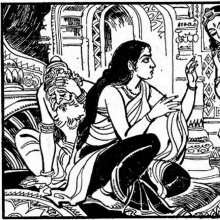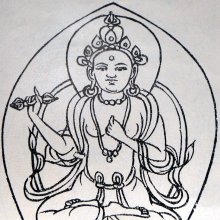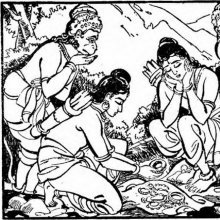Sorrow: 2 definitions
Introduction:
Sorrow means something in Hinduism, Sanskrit, Jainism, Prakrit. If you want to know the exact meaning, history, etymology or English translation of this term then check out the descriptions on this page. Add your comment or reference to a book if you want to contribute to this summary article.
Images (photo gallery)
In Hinduism
Natyashastra (theatrics and dramaturgy)
Source: Shodhganga: Elements of Art and Architecture in the Trtiyakhanda of the Visnudharmottarapurana (natya)Walking in Sorrow is associated with Sthira-gati: one of the various Gatis (“way of walking”) (in Indian Dramas), according to the Viṣṇudharmottarapurāṇa, an ancient Sanskrit text which (being encyclopedic in nature) deals with a variety of cultural topics such as arts, architecture, music, grammar and astronomy.—Sthira-gati denotes the steady movements. To show walking in fever, hunger, disease, tiredness due to penance, dissimulation, excitement, love and sorrow or ease, slow gait should be adopted by the artist. The lover who goes to meet his or her secret lover adopts the sthiragati. In darkness or if a deformed creature is visible or if a person walks a long way, the gait of a person becomes automatically slow down.

Natyashastra (नाट्यशास्त्र, nāṭyaśāstra) refers to both the ancient Indian tradition (shastra) of performing arts, (natya—theatrics, drama, dance, music), as well as the name of a Sanskrit work dealing with these subjects. It also teaches the rules for composing Dramatic plays (nataka), construction and performance of Theater, and Poetic works (kavya).
In Jainism
General definition (in Jainism)
Source: academia.edu: Tessitori Collection ISorrow refers to one of the “thirteen difficulties”, according to the “Teraha kāṭhīyā-svādhyāya” by Jinaharṣa (dealing with the Ethics section of Jain Canonical literature), which is included in the collection of manuscripts at the ‘Vincenzo Joppi’ library, collected by Luigi Pio Tessitori during his visit to Rajasthan between 1914 and 1919.—The exposition of the ‘thirteen difficulties’ [e.g., sorrow (soga)] against which one should fight as they are hindrances to proper religious practice is a widespread topic in Jain literature in Gujarati.

Jainism is an Indian religion of Dharma whose doctrine revolves around harmlessness (ahimsa) towards every living being. The two major branches (Digambara and Svetambara) of Jainism stimulate self-control (or, shramana, ‘self-reliance’) and spiritual development through a path of peace for the soul to progess to the ultimate goal.
See also (Relevant definitions)
Starts with: Sorrowful tree, Sorrowless tree.
Full-text (+1139): Shoka, Duhkha, Ekaduhkhasukha, Kheda, Socana, Pashcattapa, Asukha, Manyu, Vishoka, Ahaha, Visurana, Hridroga, Samanasukhaduhkha, Gam, Duhkhakara, Vaicitrya, Paritapa, Karuna, Harshashoka, Utkantha.
Relevant text
Search found 339 books and stories containing Sorrow; (plurals include: Sorrows). You can also click to the full overview containing English textual excerpts. Below are direct links for the most relevant articles:
Mahabharata (English) (by Kisari Mohan Ganguli)
Section CCLXXXVII < [Mokshadharma Parva]
Section XII < [Ashvamedhika Parva]
Section CCXIX < [Mokshadharma Parva]
Socially Engaged Buddhism (with reference to Australian society) (by Phuong Thi Thu Ngo)
B (2). Social ideal in the Time of Buddha < [Chapter 5]
The Festival of Theravada Tradition < [Chapter 4]
Fund Raising For the Poor and Needy < [Chapter 2]
A History of Indian Philosophy Volume 1 (by Surendranath Dasgupta)
Part 21 - Sorrow and its Dissolution < [Chapter VII - The Kapila and the Pātañjala Sāṃkhya (yoga)]
Part 6 - Avijjā and Āsava < [Chapter V - Buddhist Philosophy]
Part 22 - Īśvara and Salvation < [Chapter VIII - The Nyāya-Vaiśeṣika Philosophy]
Samkhya thoughts in the Mahabharata (by Shini M.V.)
Samaṅga Nārada Saṃvāda < [Chapter 3 - The Philosophical Tenets in the Śānti-parva]
The philosophy of Liberation < [Chapter 4 - Sāṃkhya thoughts in the Śānti-parva of Mahābhārata]
The Nature of Sāṃkhya thoughts < [Chapter 4 - Sāṃkhya thoughts in the Śānti-parva of Mahābhārata]
Mandukya Upanishad (Madhva commentary) (by Srisa Chandra Vasu)
Karika verse 3.7 < [Chapter 3 - Third Khanda]
Mantra 3.4 < [Chapter 3 - Third Khanda]
Karika verse 2.2 < [Chapter 2 - Second Khanda]
Tagore's Concept of Death < [October 1958]
‘Tears’ < [July 1952]
Meeting You < [July – September, 1984]
Related products







